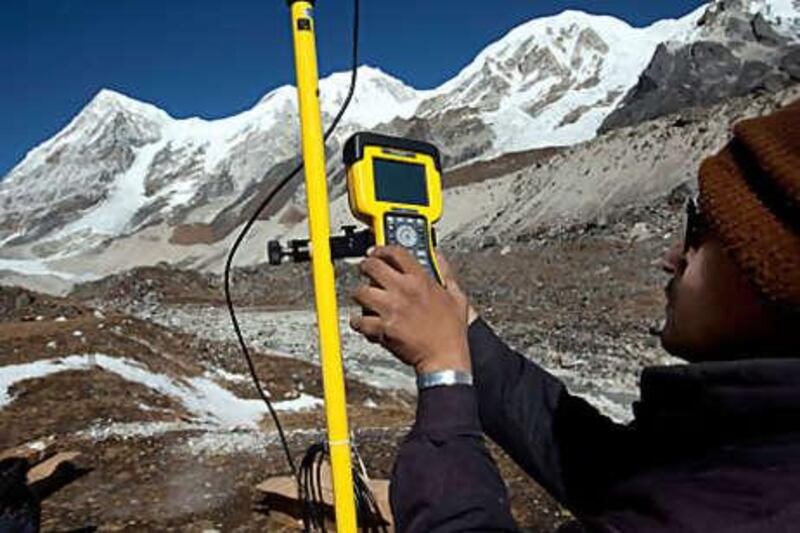LONDON // The scientists at the centre of the "climategate" scandal were yesterday cleared by an independent inquiry of falsifying data to support their contention that global warming was real and man-made. But the academics from the Climatic Research Unit (CRU) at East Anglia University, regarded as a world leader in the field, were criticised for failing to be open about their work.
The inquiry report from Sir Muir Russell, a former senior civil servant and Glasgow University vice chancellor, came just 48 hours after a Dutch government report accused the UN's Intergovernmental Panel on Climate Change (IPCC) of being prone to present a "one-sided" picture of global warming.
Both reports were triggered by the "climategate" scandal that erupted last November when more than 1,000 e-mails, exchanged over 13 years between the CRU and scientists worldwide, were hacked and posted online. Climate change sceptics claimed the e-mails proved that scientists were manipulating some data and suppressing others to back up the theory of man-made climate change. However, neither yesterday's report nor Tuesday's found evidence to support the sceptics.
Sir Muir, who was asked by the university to carry out an independent inquiry of the work of the CRU team headed by Prof Phil Jones, said the "rigour and honesty" of the scientists were not in doubt. But he added: "We do find that there has been a consistent pattern of failing to display the proper degree of openness, both on the part of CRU scientists and on the part of the University of East Anglia."
Sir Muir said that Prof Jones and his colleagues were too quick to dismiss critics from outside their own circles, but he added: "The argument that CRU has something to hide does not stand up." He said that he realised that climate sceptics would brand his report a whitewash. "It's inevitable that people who've made up their minds have made up their minds," he said. "But we haven't ducked the issues. We've gone to the heart of the issues to resolve them as best we can."
Sir Muir also urged scientists to be ready to debate issues openly with the public, including sceptics. "Don't fall into the habit of not being open or concealing things, and try to find ways of engaging people on ground that generally advances science," he said. There was a need, he added, to find a public space in which research on areas such as climate science could be subject to a "unthreatened, mature yet challenging dialogue".
Edward Acton, the university's vice-chancellor, said that he hoped the inquiry would "finally lay to rest the conspiracy theories, untruths and misunderstandings that have circulated". However, Dr Benny Peiser, director of the Global Warming Policy Foundation, a sceptics' think-tank, said that the report was a "damning indictment of the university's handling of freedom of information requests". He told BBC News: "There is clearly strong evidence of mishandling of the requests [by the CRU] and strong criticism of its failure to provide legitimate information. I don't think the university can just claim that this is a vindication. The issues will not go away with this report."
The most infamous of the "climategate" e-mails referred to a graph in which Prof Jones was said to have used a "trick to hide the decline" in world temperature data. Sir Muir said that while it was misleading not to include proper labels on the graph, prepared in 1999 for the World Meteorological Organisation, it was not a deliberate ploy by Prof Jones. On Monday, the Dutch government investigation into the IPCC concluded that there was no reason to doubt the central claims that man-made global warming was occurring but said there tended to be too much emphasis on the worst-case scenario.
Negative effects of climate change were often put forward at the expense of the benefits, said the report, and it raised questions over some of the findings of the landmark 2007 IPCC report on climate change. The principal error was a claim that the glaciers of the Himalayas could largely disappear by 2035. This was subsequently found to have no basis in fact and was retracted. IPCC scientists too often adopted a "one-sided" approach that risked being interpreted as "alarmist", said the Dutch investigators.
It cited an IPCC claim that 60 per cent of Australia's Great Barrier Reef was projected to suffer regular bleaching by 2020 without saying that this was the worst projected outcome and that, in fact, the impact might be far smaller. But the Netherlands Environmental Assessment Agency added that IPCC's conclusions pointing towards continuing global warming "were well-founded and none were found to contain any significant errors".
@Email:dsapsted@thenational.ae






